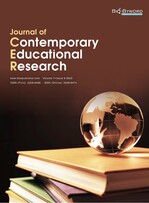Abstract
Objective: This paper aims to study the application of flipped classroom teaching model based on micro-course in the practical training teaching of contact lens fitting technology. Methods: From September 2021 to July 2023, 120 students majoring in ophthalmology and optometry were selected and randomly divided into groups. The control group adopted the traditional teaching mode, and the study group adopted the flipped classroom teaching mode based on micro-course. Teaching scores and the skills, observation and judgment, adaptability, and communication skills were compared between the groups. Results: Statistical comparison of teaching scores under different management methods showed that the clinical thinking score and practice work quality in the study group were higher than those of the control group, and the effect of the study group was better (P < 0.05). The overall scores of skills, observation and judgment, adaptability, and communication skills of the study group were better than those in the control group, and the comprehensive ability scores in the two groups were significantly different (P < 0.05). Conclusion: In practical training teaching of contact lens fitting technology, the application of flipped classroom teaching based on micro-course can improve the skill scores of personnel, and the overall effect is good. This can lay the foundation for advanced ophthalmology and optometry talents with profound theoretical knowledge and professional skills.
References
Yang Y, Zeng Y, Lian L, et al., 2022, The Design and Speculation of the Mixed Theory and Practice Integration Model in the Teaching of Contact Lens Course in the Department of Optometry. Modern Medicine and Health, 38(21): 3753–3756.
He K, Lu H, Huang H, 2020, Application of Flipped Classroom Teaching in Children Who Wear Glasses for the First Time After Orthokeratology. Journal of Nursing, 35(01): 61–63.
Geng R, Qiao Q, Yan X, et al., 2017, The Application of Flipped Classroom Teaching Mode Based on Micro-Classes in the Practical Teaching of Contact Lens Fitting Technology. Health Vocational Education, 35(07): 106–107.
Shen M, Miao H, 2019, The Design and Thinking of Optical Courses in Reforming the Mixed Teaching Mode of Ophthalmology and Optics. Science and Technology Innovation and Productivity, 2019(11): 84–87.
Isoda K, 2023, The Synergy Between Experimental and Theoretical Investigations Can Design Novel Stimuli-Responsive Photoluminescent Liquid Materials. Journal of Synthetic Organic Chemistry, Japan, 81(2): 105–114. https://doi.org/10.5059/yukigoseikyokaishi.81.105
Alamir M, 2022, Learning-Based Sensitivity Analysis and Feedback Design for Drug Delivery of Mixed Cancer Therapy in High Model Uncertainties. Journal of Theoretical Biology, 2022: 1–14. http://doi.org/10.48550/arXiv.2205.07482
